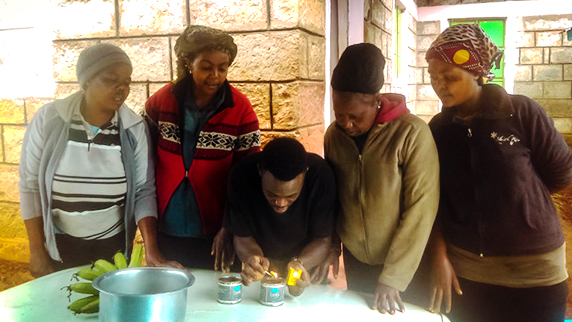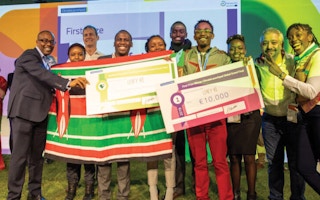Smoke rises between houses from fuels being burned for cooking, threatening both the environment and human health through carbon dioxide emissions and indoor air pollution. Meanwhile, diapers that have not been properly disposed of are polluting waterways and sewage systems and become a potential source of disease.
What do these two seemingly distinct problems have to do with one another? For starters, they are two of many hazards that the residents of Kibera — an informal settlement in Nairobi, Kenya, and one of the largest such settlements in Africa — have to live with every day.
But both also were seen as an opportunity by the founders of a Nairobi start-up called LeafyLife that aims to recycle used diapers to produce a cheap, sustainable and clean fuel.
Dennis Muguta, Melvin Kizito and Peter Gachanja, the founders of LeafyLife, had to overcome many challenges when bringing their invention to life.
As in many other low- and middle-income countries, training, funding and support for budding entrepreneurs is not easily accessible.
According to the latest report of the Global Innovation Index, with the exception of China, every one of the 30 countries leading in innovation is a high-income economy.
In response to this need, large players in the worlds of economics and innovation, including the World Economic Forum and the European Union’s European Institute of Innovation and Technology (EIT), have started initiatives to make innovation more diverse and support sustainability entrepreneurs, like LeafyLife, worldwide.
Global sustainability solutions
The ClimateLaunchpad competition, organised annually by EIT Climate-KIC, a public-private partnership funded by EIT, is one such initiative.
Participants receive extensive coaching in entrepreneurship while the top 16 finalists also gain access to a business school for cleantech entrepreneurs, and developing start-ups receive mentorship, training and access to investors who help them turn into fully-fledged cleantech businesses.

The founders of LeafyLife saw an opportunity for innovation in two hazards that the residents of Kibera face Image: LeafyLife.
After winning the competition in 2019, the entrepreneurs at LeafyLife were able to secure funds, partners and collaborators to help them advance their invention.
Diapers are complex waste, says Muguta — to be able to produce a clean-burning fuel, they have to be cleaned and deconstructed into their building blocks, some of which can then be turned into a fuel gel. Chemists by trade, Muguta, Kizito and Gachanja welcomed the engineering help they received from their newly acquired collaborators.
“I would say all the partners that we have at this moment, is because of Climate Launchpad,” says Muguta. “The acceleration programme that Climate Launchpad has been taking us through has equipped us with quite a lot of knowledge.”
Another initiative, UpLink, is a global platform aiming to discover breakthrough sustainability ideas. Hosted by the World Economic Forum, the platform crowdsources innovations by bringing together innovators, experts, investors and decision makers with the aim of working toward the UN Sustainable Development Goals.
UpLink launches challenges on different themes, such as ocean health and reforestation. After review by an expert committee, finalists receive mentoring, consideration for investment opportunities and exposure on World Economic Forum platforms.
“One of the big vision aspects of UpLink is that we can do more to support underrepresented markets, geographies, segments,” says John Dutton, the head of UpLink. Half of the finalists of the first Ocean Solutions challenge came from emerging markets, he says.
The winner in the “tackling ocean plastic” category was a Myanmar-based company called RecyGlo, which aims to provide a sustainable recycling and waste management system for Southeast Asia that includes waste collection, waste awareness training, recycling and waste auditing services.
Through representation on the World Economic Forum, the company was able to get an introduction to the government in Indonesia and has set up offices in Singapore and Malaysia.
Obstacles to innovation
While such programmes are a promising way to surface ideas that otherwise might be missed, Soumitra Dutta, the founding editor of the Global Innovation Index, cautions that they cannot solve all the challenges that low and middle-income countries face when it comes to innovation.
“I think the challenge in emerging markets is not that people don’t have ideas. People have ideas,” Dutta says. “The challenge is the country context, the institutional environment, the whole infrastructure, the whole political, regulatory environment. All these things are not supportive, often.”
LeafyLife has so far solely relied on the funding it received as a prize from the competition. However, to move forward, it will have to acquire investors, which is another challenge.
“It’s always higher risk for a western investor to invest in emerging markets,” says Dutta. “If you’re a startup in an emerging market, often investors want you to come and base yourself in London, or in Silicon Valley or somewhere, before they give you money. It’s a very human tendency to want something that is important for you close to you.”
As a way to make it easier to find investors for global projects, UpLink co-designs its competitions with expert organisations as well as venture funds.
The second Ocean Solutions challenge, for example, was co-designed with the Nature Conservancy and with Aqua-Spark, a venture fund eager to invest in entrepreneurs working on sustainable aquaculture solutions.
While there is still a long way to go to make these programmes truly accessible all over the world, the invested effort is already paying off in the case of LeafyLife.
Although the company’s technology is still in the development stage, it has been distributed to some households already. In low-income countries, indoor pollution from using cheap fuels such as charcoal and kerosene accounts for 6 per cent of premature deaths every year.
“By substituting charcoal and kerosene, we are in a major way, impacting the health of residents of this region,” Kizito says.
Some of the world’s biggest problems waiting to be solved are in countries where entrepreneurs don’t have access to the same type of resources as, say, their counterparts in Silicon Valley.
Yet the people facing those problems day to day may be the best source for solutions.
With programmes like UpLink and the Climate Launchpad, innovative ideas from anywhere could have a better chance of turning into solutions — and helping people everywhere.
This story was published with permission from Ensia.com. Read the full story.

















